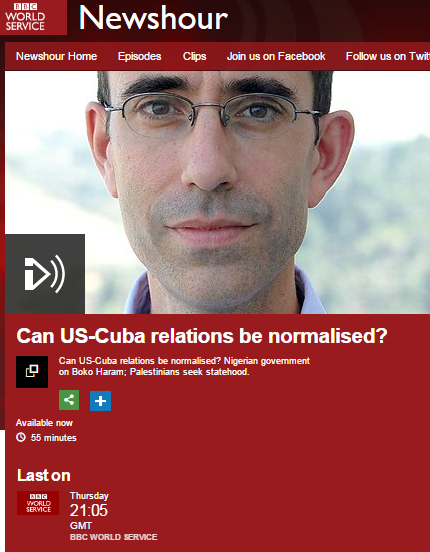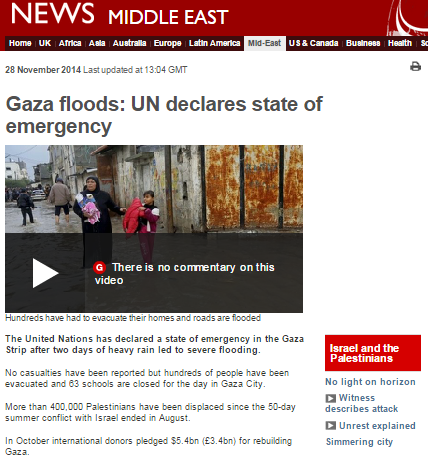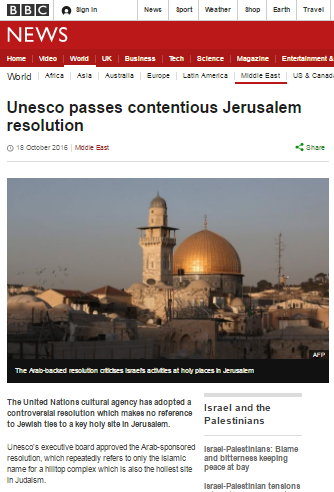As was noted here previously, the BBC News website’s coverage of Jordan’s submission of a draft resolution on the issue of the Arab-Israeli conflict to the UN Security Council on December 17th did very little to enhance audience understanding of the content of the draft resolution itself, the timing and motivation behind the move, its significance in the overall topic of peace negotiations or the reasons for other countries’ objections to it.
But did audiences on other BBC platforms perhaps fare better? The BBC World Service radio programme ‘Newshour’ has a weekly reach of about 43 million listeners and in the December 18th evening edition of that programme, presented by Tim Franks, one of the topics was billed as “Palestinians seek statehood”. The item – available here from 14:05 – was introduced by Franks as follows:
“The peace process between Israel and the Palestinians tends to attract all sorts of uncomplimentary adjectives: things like ‘moribund’, ‘non-existent’ or just plain ‘dead’. So the question being asked in foreign ministries around the world is what will be the impact of the Palestinians taking their quest for statehood to the UN Security Council? A draft resolution recognizing the Palestinian state was submitted by Jordan yesterday, calling for a deadline to the end of Israeli occupation and a deadline for a conclusion to peace talks. Today Israel weighed against the move – a gimmick and counter-productive went the argument – and within the last few hours the US State Department spokeswoman Jen Psaki said that the new draft resolution is ‘not something we would support’.”
After that promising start, listeners may have anticipated hearing – perhaps from an expert contributor – about the details of the draft resolution itself and just what it is about it that caused that US State Department reaction. If so, they would have been sorely disappointed because ‘Newshour’ editors apparently deemed that information unimportant to audience understanding of the issue and elected instead, for reasons not made clear, to devote their entire coverage of the topic to the amplification of the political opinions of a member of the British Jewish community. Franks introduced her thus:
“Now though, one prominent member of the Jewish diaspora has joined the debate. She’s Rabbi Laura Janner-Klausner; the senior rabbi to the British Movement for Reform Judaism. What did she make of the Palestinians’ move?”
LJK: “I think from their point of view its extremely sensible decision to lobby in any way they can that is non-violent.”
TF: “You support the decision?”
LJK: “I think that anything that moves us forward towards two states is a good thing. I don’t think that this is the practical solution but it sets a target. It says we want two safe, solid, secure states.”
At that point, any listeners who had managed to study the text of the draft resolution before hearing this item must have wondered if Rabbi Janner-Klausner had actually read it herself given that, via its reference to Resolution 194, the text promotes the notion of the ‘right of return’ to Israel for millions of Palestinian refugees. Franks goes on:
TF: “The argument from the Israeli government is that actually it distances the prospect of a peaceful resolution because it is – in their words – a gimmick.”
LJK: “I don’t think it’s a gimmick. I think it’s using any kind of political system that is legitimate to make their point. I think it moves the dynamic and the dialogue forward. I don’t think it’s the end at all and unilateral decisions are not the way but it says we will do something that is non-violent and I lived through two Intifadas in Israel: it was awful and I would never want to see another one.”
TF: “But how does this advance the actual hard graft of negotiations – ‘cos that’s the other main Israeli government argument, which is that you simply can’t do these things unilaterally. You have to sit round a table and you have to bash out all the hard issues like borders, like the status of Jerusalem, like refugees and simply, you know, getting this token endorsement – if indeed they do get one at the UN Security Council, although the Americans sound very dubious about it – is not going to advance the reality of peace.”
LJK: “As a rabbi I know that narratives are very important and the narrative that brings the word Palestinian state into the public zone is key. And yes; we will have to bash out all the details – water, security, land, everything. This is only to set the target.”
In fact, the aim of the draft resolution is of course to dictate the results before any final status negotiations even take place and thus to impose a solution rather than arriving at one through mutual discussion. Laura Janner-Klausner’s inaccurate and misleading representation of the issue, however, will not be understood for what it is by any listener who has not studied the draft itself or the background to its presentation and that of course means most of the people listening to this programme. She goes on:
“But as a rabbi I am constantly want to move forward to justice and peace and dignity – as do British Jews. They want two states for Israelis and for Palestinians. And this might – just might – take us a step forward. In this we’ve been in such a difficult situation for so many years. If there is a possibility of a shift we have to try it.”
Ignoring the fact that (with all due respect to what British Jews may want) it will of course be Israelis who have to cope with the fall-out of any further failed peace initiatives, Franks goes on to say:
“There’s often a tension…ah…when people talk about the views of Diaspora Jewry – those Jews who live outside Israel – ahm…when it comes to their attitudes to mainstream Israeli thinking or what the Israeli government is doing. You’re clearly disagreeing with the Israeli government’s view on this. Is that awkward for you as a prominent figure in British Jewry?”
LJK: “What’s wonderful about British Jews is that they are very diverse. Lots of people support the Israeli government and lots of people don’t. But what unites the vast majority of British Jews is a desire for two states and for justice and peace and dignity for both peoples.”
Of course successive Israeli governments of all stripes have being trying to achieve exactly that for over two decades, but Franks makes no attempt to inform listeners of that fact. Adopting the misleading BBC practice of portraying the Arab-Israeli conflict as the only issue in the entire Middle East, he continues:
TF: “How soon do you think there could be peace in the Middle East? It’s been so often forecast, so – well, up to now – never achieved. Are you optimistic?”
LJK:” I am optimistic. I have no idea how soon but we’re not so special. There’s a narrative out there that says Israelis, Palestinians: so special that they’ll never reach a peaceful solution. With every single conflict – even the Hundred Years War – ended. This will end and if we start with that narrative – not that it won’t end but that it has to end – then we might change the dynamic.”
Obviously Rabbi Laura Janner-Klausner was not invited by the BBC to spend four minutes or so talking about this topic because of her position as a spiritual leader of one of the smaller denominations of British Judaism. This item is entirely about politics and hence audiences should have been informed of her political affiliations before the item commenced in order to enable them to put her presentation of the topic into its appropriate context.
Those political affiliations include her high-profile involvement with British Friends of Rabbis for Human Rights which supports the agenda of that political NGO “both ideologically and financially”.
Given that this item is one of the few relating to the Jordanian-presented draft resolution and that the issue has not been adequately explained to BBC audiences on any other platform so far, the importance of adherence to BBC guidelines on impartiality by “summarizing the standpoint” of the sole interviewee in this item was all the more crucial.




